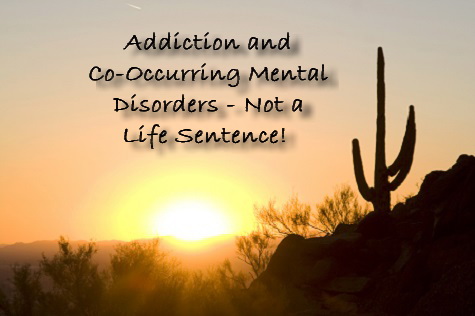Addiction and Co-Occurring Mental Disorders – Not a Life Sentence
Daphne sat across the table from her husband and mouthed the words, “I hate you.” Then she painted a charming smile on her face and ordered a salad. She and Sam were out to dinner with his family, something they did only rarely because of what Sam’s mother referred to as “Daphne’s drinking problem.” What no one at the table knew was that Daphne had a gram of cocaine in her clutch and no plans to drink more than one cocktail. To everyone’s surprise, a single margarita is all she had that night.
For the next four weeks, Daphne’s behavior was erratic. She didn’t find herself sneaking bottles of wine or vodka, passed out on the sofa in front of the television or lying in the floor of their shared walk-in closet, crying her eyes out over every conceivable wrong done to her in the past. Instead, she was scarce, hardly ever at home. When he did see her, she was wild with energy and ideas, frenetic to dress and shower and be off again. Her already thin frame appeared unusually slight. It didn’t look as though Daphne had been eating, or really doing anything but moving, fast.
Then on a Sunday afternoon, just like it had started, Daphne was suddenly home again—collapsed on the lawn, so drunk Sam could nearly smell the alcohol from the front door. Ever the co-dependent faithful partner, he walked to his wife and bent to scoop her into his arms. And just like clockwork, Daphne began to slur a litany of praise for her husband, how she could not live without him, how he was perfect in every way.
Days into Daphne’s return, however, she was threatening to stab herself with a kitchen knife if Sam didn’t give her access to all of her pain medication. Daphne received prescription opiates for a cracked cervical vertebra, and Sam sometimes hid them when Daphne’s drinking binges got especially bad. When she took the knife and started carving shallow cuts into the inside of her arm—something Daphne had done many times before, but always in private—Sam knew it was time to do what he had not yet done. He had his wife involuntarily hospitalized. An emergency hospital stay turned into a longer, voluntary in-patient psychiatric stay, and it was there that Daphne was formally diagnosed.
She was an alcoholic. She was a drug addict. She had anorexia. She had bipolar disorder. And she had borderline personality disorder. No one had expected this outcome, least of all Daphne.
Mental Disorders and Addiction
When a person has both a problem with addiction and a mental disorder, he or she is said to have a dual diagnosis (or comorbidity). Many times, substance abuse can mask the signs of mental illness. Traits or characteristics of mental illness, which may otherwise be quite noticeable to close family members and loved ones, cloak themselves in the depressed behavior brought on by excessive alcohol use (alcohol is itself a depressant), or the erratic behavior others exhibit whether using alcohol excessively or when high or seeking drugs.
People with certain mental disorders may seek to “self-medicate” the anxiety or depression that arises as a result of the disorder by consuming alcohol or using drugs, or a combination. One such disorder is bipolar disorder. About 56 percent of people with bipolar have experienced drug or alcohol addiction. The personality disorders, such as borderline personality disorder (BPD), also share a high rate of dual diagnosis. According to the Center for Drug and Alcohol Programs at the Medical University of South Carolina, “Over 50 percent of drug abusers and almost 40 percent of alcoholics have at least one serious mental illness.”
Besides bipolar and BPD, depression, anxiety disorders, schizophrenia and other personality disorders frequently co-occur with substance abuse. Psychiatric issues can begin before or after the onset of substance abuse.
Treatment for the Dual Diagnosed
There is no question that adding disorders and substance issues to the mix significantly compounds an individual’s stress and further complicates treatment options. Those who have co-occurring mental disorders have a higher rate of relapse when it comes to getting sober. But even people with mental disorders and co-occurring substance abuse issues can begin to heal. What helps is an integrated therapeutic approach—where mental health treatment and addiction recovery are not thought of as separate, but fused into an integrated whole. Compartmentalizing too many areas of her life is often how an addict with mental health issues gets to the place in which she desperately needs recovery, so seeing her life as a working whole is important.
Thinking, “I cannot attend to my sobriety if I do not attend to my bipolar disorder” and vice versa is a good way to think about it. It’s quite true, in fact—not simply a bromide offered by practiced faces in the business of therapy.
While Daphne’s situation may seem extreme, it is likely that the deeper part of her issues are connected. When she begins to do the work to unravel what the deeply held beliefs and long-held stories that most affect her mental state are, she may begin to find herself experiencing better balance—and an ability to deal with the boat-rocking experience of finding herself with a half-dozen labels, all too frightening to think about in the beginning.
Becoming educated about the nature of addiction and the reality of mental illness is a good place to start. Choosing to look at one’s life carefully is the opposite of what addiction means. When you wrestle the hydra of addiction and mental illness, you know you’re only going to get more of the same. Better not to go in swinging but with clarity, a willingness to learn and possibly, maybe, a little bit of room for something like hope.




